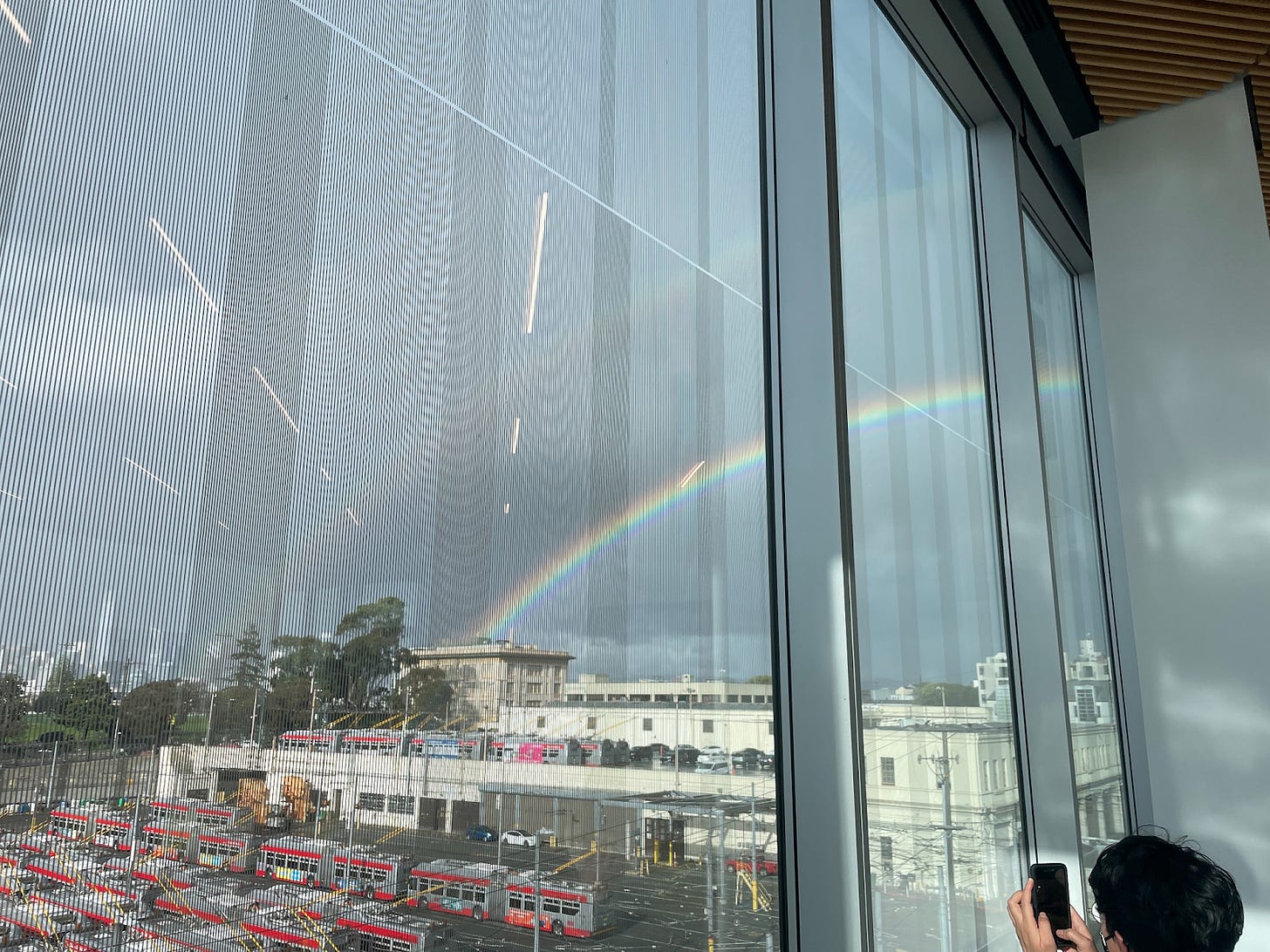Reboot turns four years old today, which both feels like forever and no time at all. For this anniversary, I wanted to take you behind the scenes of what it takes to produce a print magazine—something that feels especially improbable in this day and age.1
There are two components. First, a videotaped conversation between Jessica and myself (click to watch, or listen via Spotify or Apple Podcasts), and second, a painfully earnest essay I wrote the day after Reboot Community Day, the launch-party-cum-symposium we threw in San Francisco. We reflect on the role of luck vs. the role of effort; the eroticism of Google Doc comments; what differentiates Reboot’s editorial approach; and why values-aligned communities matter.
How to Beat the Odds
By Jasmine Sun
I am always terrified that no one will come. Perhaps it’ll be seventy-five and sunny and people would rather spend the day drinking in the park. Perhaps everybody’s grandmother will fall sick at once. Perhaps a few will come, but only in the last twenty minutes, after we stumble through hours of empty readings to a room of chairs. Perhaps, perhaps, perhaps.
In the last four years of running Reboot, we’ve hosted more Zoom talks and launch parties and discourse brunches than I can count. I should probably feel more secure now, but I don’t; we haven’t hosted a single event where we knew for sure that people would come; and I don’t know if there’s a single event where people have not. I’m at Reboot Community Day now, and it all feels surreal. I can never believe my eyes.
It is a real gift of commitment not only to add your email to a mailing list, not only to buy a magazine via Shopify’s hyper-optimized payment flow, but to—in this digital day and age!—ferry your flesh-borne self into a room of so many other strange and unknown selves. To deal with transit times and hangovers and eye contact and germs. It is one thing for our team to log into Twitter and check our follower count, or to see the six-thousand-and-some who have “subscribed”; it is another entirely to face a crowded room atop the KQED headquarters, where there are so many people they are squished into corners and sitting on floors, clusters of humans packed together against windows backed by the sun-kissed San Francisco hills.

The theme of Kernel Magazine Issue 4 is LUCK: What are the odds? Jacob, our editor-in-chief, is a genius for coming up with this; in their editor’s note, they write:
The uncertain nature of the future is not a flaw to be corrected or calculated away, but its saving grace. We need the future to not be fixed―to remain tenuous and underdetermined, wrapped in clouds. It is only through this cloud of uncertainty that we can have hope―the hope that the problems of the past are not preordained to recreate themselves in the future, the hope that we can beat the odds.
When I hold Kernel in my hands or run check-in on hundreds of visitor names, I can’t help but think: Nothing could be more improbable than this, no theme more appropriate than this. Really, now—what are the odds?
You have to be a little bit delusional to start a print magazine. I wish I could say there was a grand plan, but there wasn’t. We had lots of ideas and we tried some. We made mistakes; enough things worked to keep going. If we knew how hard this would be, I don’t know if we’d have started at all. (Caveat: They say this about startups, about parenthood, about many of the best things in life.)
The first year of Reboot looked something like this:
Jessica and I are bored undergrads when the pandemic hits in March 2020. We hope a few favorite authors—Wendy Liu, Jenny Odell, Ken Liu—will speak to us if we create a fake organization to host them now that their book tours are canceled. We send cold emails; astonishingly, they say yes.
We eventually collect three hundred emails on a Substack list. We use the lightning emoji as our makeshift logo, figuring that we’d change it soon (this takes three years). I can’t get a job in journalism—it’s 2020, after all—and figure I’d learn to write and edit through the newsletter. I text a handful of friends, begging them to write for us: It’ll be fun! Remarkably, they say yes.
It’s December now. Attendees enjoy the events and ask how to keep the conversations going. I make up a fellowship, because it sounds more legit than a book club. I email my university asking for a $1000 book budget right before winter break. They say yes; applications go out; miraculously, over 200 students apply from all over the world. I find four wonderful volunteers to run the fellowship with me; we meet every week and write the syllabus as we go. Many of us are still friends today.
I spend early 2021 living with friends in Cancun, most of whom work on their own companies. I wonder: If they can start a startup from a group house, why not a magazine too? A housemate and I scramble together ten thousand dollars in small grants and rent a farmhouse in Asheville. We think it can’t be so hard; we plan to go in as strangers and come out with ten print-ready pieces. This was idealistic—it took until September to launch. But we did.
One of my favorite “productivity hacks” is to take something hard I want to do and just start telling everyone I’m going to do it. Even better to throw out a launch date, too. Collect registrations before the details sort out. I could tell while working with our institutional partners on Reboot Community Day that they thought we were a mess, and of course we were. But like most times, we made it work.
Here’s the thing: There’s no prestigious council of experts somewhere deciding who gets to start a magazine, a fellowship, or a conference. You don’t have to submit reams of paperwork or a PhD-grade defense. You have to have an idea and actually do it, but at the start, you’re only accountable to yourself. Because so few people follow through, again and again, your community will remember if you do. If you can prove there’s demand for the jankiest version of the thing, you’ll get support next time to do it right.
Talking about Reboot always makes me feel like I’m dispensing startup advice. Bootstrap, prototype, make sure to show traction before you raise. You must believe you can beat the odds. You can’t get scared by not having experience. Tell the most ambitious version of the story—you have to let yourself trust your most starry-eyed dreams. You can’t control your fate, but you can make yourself luckier. The only way to know is to try.
None of this is easy, to be clear. Anxiety aside, building an organization is a lot of work. We can’t pay writers as much as we want to; we end up paying ourselves even less. We’re all full-time students or have full time jobs. For years, I spent all my PTO going to conferences to meet funders, persuading myself it counted as vacation even though I never saw a beach. It’s endless cat-herding, grant apps, post-work Zoom meetings instead of drinks. (I’m talking about myself because it’s what I know, but every core contributor has this experience.) I asked Jessica to do this podcast with me and she said she wasn’t sure, she really couldn't recommend this path to everyone. In the weeks leading up to Community Day, I spent every night tossing and turning to-dos in my mind. Why did we do this to ourselves? I couldn’t fall asleep.
But the days roll over and the sun comes up—and when we’re setting up for Community Day, people are not only here but early, coming in from San Jose and the East Bay and even Boulder, Colorado—and I’m so underslept, but I can’t stop smiling because today everything is beautiful. I don’t think you’re supposed to talk about this stuff; it’s too self-indulgent. But I’ve met too many founders and community-builders who burned out on their dreams—there really isn’t support for anything but hyperscale in this venture-backed world—and it feels like a kind of moral obligation, an existence proof, to keep this all up.
I feel so grateful and so very, very lucky. As much as I love it, I don’t know if this project is a rational thing to support; there are more measurably productive ways of spending thirty dollars or a Saturday afternoon. But it is this same irrationality that gives me hope for technology and hope for the future. These are the cracks in cold economic logic. Proof that people would sometimes rather sweat side by side than have their bread and circuses. Print is the kind of thing you do because it’s hard, because it doesn’t seem quite worth it. Effort strengthens the relationships built through late-night copyedits and layout sessions; it shows the public—viscerally, when they hold a copy of the magazine, when they see the details in the cover art and the precision of the pages—that we are serious about what we say.
After all, Reboot’s version of techno-optimism has always been about agency: Optimism not in the inevitability of technological progress, but in our abilities as thinkers, builders, and community members to shape our tools for better ends. A belief that you can will the things into the world that you want to see exist. That we can transcend collective action problems, that solidarity is real. In “Spadework,” a masterpiece of an essay about grad student organizing, Alyssa Battistoni writes: “The entire problem of collective action is that it’s rational to act collectively where it’s not to act alone. And you build the collective piece by piece.” We hope this magazine manifests one small piece of that ethic.
About a year ago, Reboot went through a difficult transition. The burnout was real; it was either focus or quit. I’d hoped to find someone excited about running the organization full-time and I didn’t succeed. Several team members stepped down to pivot to bigger and better things, preferring to hang back as community members instead. The bonding and breaking of collaborative circles—it’s inevitable but it stings all the same. In response, Jessica and I decided to hit pause on the fellowship, restructured the core team, and committed to doing fewer things better. I spent months writing an essay to first verify, and then reaffirm the value of our work. I told myself it was okay if Reboot didn’t grow—we just needed to sustain. (How appropriate that next came Issue 3: SUSTAIN: Are we there yet?2)
In the year since, I’ve felt luckier than ever for what the team has accomplished. The quality of the writing is incredible—we showcase work that can’t be found anywhere else, in a media ecosystem where there are fewer and fewer places to publish creative longform. In Reboot and Kernel, you can read a machine learning engineer’s reflection on love, loss, and probability; a young founder’s candid reckoning with Silicon Valley’s toxic culture; an original vision for artist-made datasets; and a requiem for iPhone jailbreaking as political resistance. There are speculative stories about bio-augmentation and poems about algorithmic life. In sharing their stories (and often friendship too), our contributors have redefined what ambition and success looks like for me. They’ve expanded my aspirations; prizing generosity, nuance, sincerity, and creativity over the industry standards of dogma, opportunism, and prestige. Making it easier to embrace the higher virtues—that’s what every good community achieves.
On Saturday, I gave the closing remarks for Reboot Community Day. Thanked the attendees, thanked our team, and thanked our partners. I asked everyone again to buy the magazine. We played a game at the point of sale: Flip a coin twice; if you land two heads, you’ll get the gold foil cover. It’s a gimmick, of course, but the metaphor felt apt. I flipped a lot of coins that day. When I put down the microphone and rejoined my friends in the crowd, they said that a double rainbow had crossed the sky.

closing note
Please do get a copy of Kernel to support our work. There are fewer than 10 copies of Issue One left (totally nuts btw), so we’re limiting sales to the $200 Collector’s Bundle. That bundle is the last and only chance to get Issues One and Two. (And of course, you can still get Issue 4: LUCK for $15-30.)
Thank you so much for helping make this happen.
We’re feeling very, very lucky,
Jasmine, Jessica, and Reboot team
If you’re new to Reboot, our manifesto “Take Back the Future!” or “Does Tech Criticism Still Matter?” might be a better place to start.
Jessica tells me that this theme was intentionally meta 🧠













